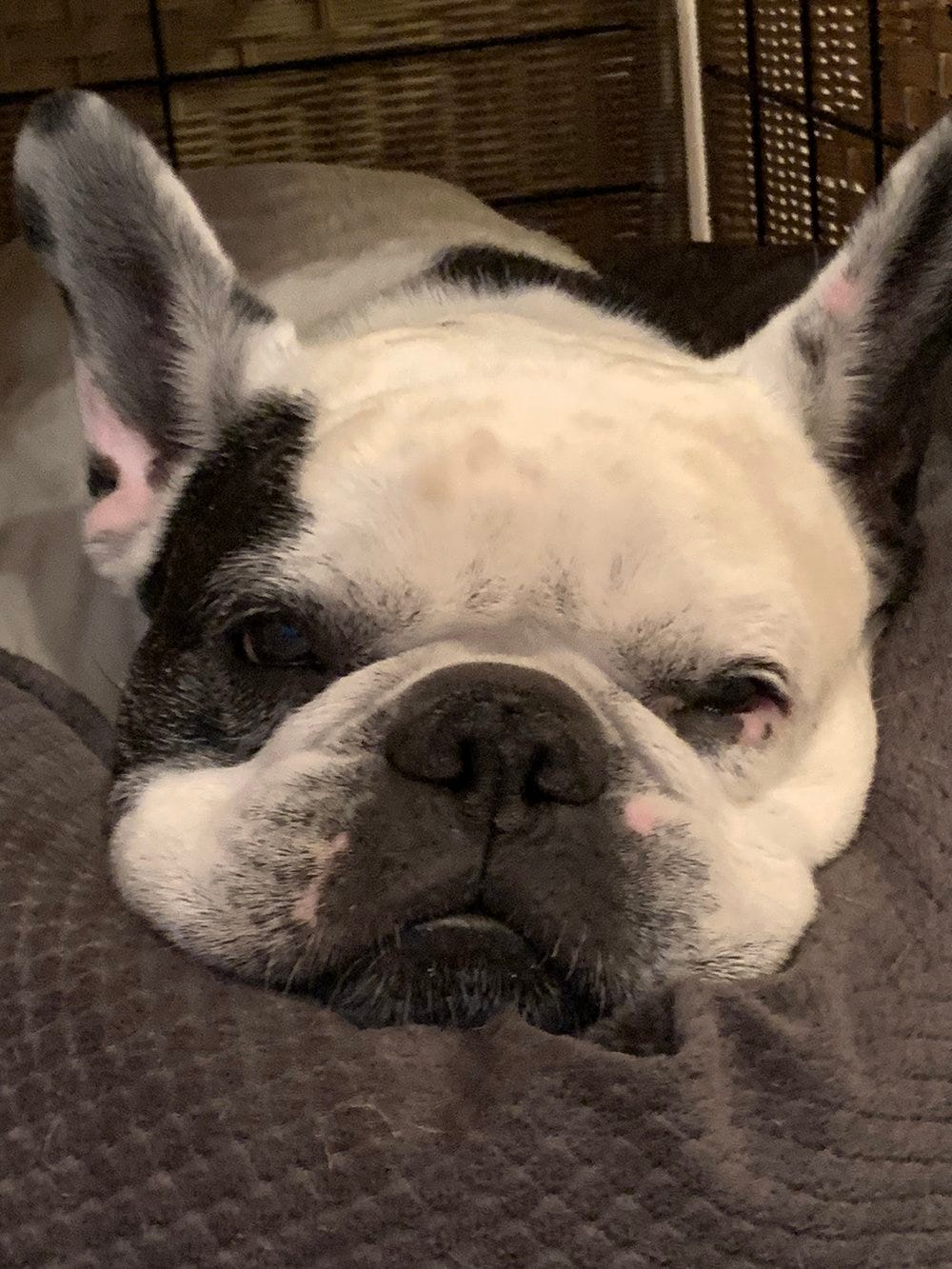Shame Holds Our Grief Hostage
I got triggered reading Deadline (a trade publication for the entertainment industry).
A project got greenlit that had similarities to something I had developed years ago. (Who hasn’t had the experience of “That was my idea!?!) It was a mild trigger compared to others, but I still felt bummed.
I didn’t share these feelings with anyone because I didn’t want to sound whiny or unprofessional. I also didn’t want to hear things like, “Happens all the time” or “You should sue them” or “Do something nice for yourself.” Those words sound judgmental, nuts or condescending.
So I sat by all by my lonesome … feeling sad. (This photo of my dog is my sad avatar.)
Sheesh, grief can be a lonely experience.
Hard truth: when grief goes unacknowledged, it gets really, really lonely.
Unacknowledged grief is also known as dis-enfranchised grief (<— which I wrote a blog post about). Bottom line is that it’s a kind of grief in which the loss is not socially mourned or publicly supported. It’s the leper of loss.
If I’m super honest with myself, I don’t feel comfortable reaching out to anyone when I’m sad because I’m ashamed. I’m a coach for goodness sake. I should be able to coach myself out of feeling sh*tty.
Shame doesn’t work that way. Shame tells us stories about ourselves to keep us small, closeted, and alone.
Brene Brown has done a ton of work around how the antidote to shame is vulnerability. She writes and talks about how shame grows through secrecy, silence and judgment. So if you give it a lot of empathy, it can’t survive.
What’s empathy? The ability to understand and share the feelings of another.
A lot of folx have empathized with my feelings of grief from losses in my professional career. They’ve DM’d or emailed me privately to say thanks for publishing this blog. The feedback has fueled me to keep going, to keep digging, to keep being vulnerable. Here’s some of what they have had to say:
· Work that has supported me since I was 24 is gone…
· I’ve aged out of the career I used to be in…
· I did everything I was supposed to do and I didn’t feel fulfilled…
· I wrestle with the lack of fire in my belly…
· Did I take the right path
· I don’t want to be adjacent to my dream…
· I’ve become rotten fruit…
I’m so freaking proud that these people have been vulnerable and started the process of bringing light and air into their grief. And for many folx, it’s the first time they’ve been able to say certain words out loud or even acknowledge to themselves the loss they have experienced.
What happens after noticing and naming the feelings, and sharing with others to stop the spiral of shame? The next step is to look at the meaning that’s been created from the feelings.
Let’s unpack my Deadline trigger and the meaning I created:
· I read about a project that was similar to something that I developed.
· My first thought is something along the lines of “That was my idea.”
o Important Note: thought always leads to feeling.
· As a result of my thought, I feel bummed, left out, angry, resentful, and ashamed.
· The meaning I have assigned: I wasn’t good enough (to get the project made) / I’m not good enough / I’m useless.
Let me ask you, is the thought “I’m useless” helpful or hurtful?
Clearly hurtful.
In determining that this is not a helpful thought, I can look to re-write the narrative into one that is helpful. Alternative thought options:
· Happens all the time.
· I should sue them.
· I’m going to eat a bag of Trader Joe’s white cheddar popcorn.
Are any of these helpful? Mildly … they feel like first ideas. So I keep editing and I reach out for help because I can get stuck in a shame spiral and no new ideas come to me.
More alternative thought options after consultation with a friend who has more perspective on this than I do:
· I was on to something.
· My idea was premature for the marketplace.
· In the future, I need to package/position my projects better.
With these alternative thought ideas, I’m balancing the truth, belief and discernment. And what starts to bubble to the surface with the new meaning that I’m creating over my loss is agency and hope.
I do have good ideas. Timing is critical and while I don’t have a crystal ball, I can trust my intuition. I can take agency in the future by doing a better job of packaging my ideas with elements that will make it more desirable and fit the needs of the marketplace.
Grief is not wallowing in suffering.
👍🏾 Grief is acknowledging pain.
👍🏾 Grief is respecting the pain as sacred.
👍🏾 Grief is finding meaning.
👍🏾 Grief is taking agency.
What’s an example of how you might take agency from your loss?
If you’d like guidance in creating a ritual for loss consider joining PERMISSION - a support group for those experiencing dis-enfranchised grief. PERMISSION is a confidential, intimate, sacred space for those in the entertainment industry who are looking to have their experiences of loss witnessed and validated. Through sharing, presentations and various exercises, participants will find community and connection as well as tools to find agency and meaning. Learn more about PERMISSION and sign up. Space is limited due to the nature of the group, and participants will be required to sign a confidentiality agreement.
If you know of someone who might benefit from this work, please forward this blog to them.
If you’re resonating with what you’re reading, please consider subscribing to my e-list. What’s that mean?
🙌🏾 You’ll receive regular emails (with lots of heart and a bit of humor) that share a tool or insight from my coaching practice.
🙌🏾 Typically the email will have a question at the end to provoke thought that supports you in your growth.
🙌🏾 Updates about my coaching business (offerings, free stuff, recommendations, referrals.)




